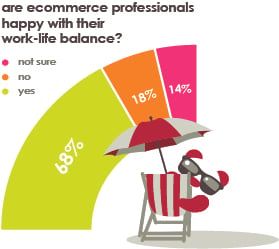What are the current sentiments toward work-life balance in ecommerce? Are ecommerce professionals happy with the bridge between work and home-life or are the foundations shaky?
In part 1 of our focus on work-life balance in ecommerce, we started by looking at the average working week for our 2017 ecommerce salary survey respondents. After contracted hours comes overtime, which is significant in determining happiness with work-life balance. Make sure you catch up before you proceed!
We still have plenty to cover, so buckle up and enjoy part 2 of our work-life balance in ecommerce #PandaPounds feature.
The big question: Are ecommerce professionals happy with their work-life balance?
Work-life balance in ecommerce felt achievable for many respondents, though this feeling decreased the more overtime our respondents completed (as seen in part 1.) Putting overtime aside, and viewing the responses collectively, how many are happy with their work-life balance?

The verdict is in…68% of our respondents are happy with work-life balance in the ecommerce industry. It looks like there is a bit of a way to go for ecommerce employees to be satisfied with this! 18% are adamant that they are not happy with their work-life balance at all, while 14% aren’t quite sure.
So why is it that 32% of our respondents cannot definitively say that they are happy with their work-life balance? Let’s find out and look at different aspects of working life that could play a part in the respondents not feeling completely happy with work-life balance.
What could improve work-life balance in ecommerce?
Looking at the statistics in part 1 of our work-life balance feature, 89% of ecommerce professionals complete overtime in the working week. This ranges from a few minutes here and there to over 5 hours a week.
We should start here, because some respondents felt that overtime is sometimes just a part of the job…especially in the busy world of ecommerce. However, they should still feel happy about this regardless of whether they feel it’s required of them.
Paid overtime in ecommerce
We asked the respondents who completed overtime if they were paid for the additional hours. 95% do not receive pay for overtime, while the remaining 5% do. However, of those who do get paid for overtime, 62% say they are happy with work-life balance in ecommerce. Furthermore, only 22% are happy to do the overtime, meaning 78% are not entirely sold on doing overtime.
This means that even with paid overtime, not everyone is completely happy. Does this mean that it’s not just about being recognised financially? Do ecommerce professionals require more company benefits? It certainly looks like more can be done for people to feel happy at work and not feel it is eating into their home life.
Can management improve work-life balance in ecommerce?
We asked those who are either not happy with their work-life balance in ecommerce or not sure about their feelings, if they believed management could be more encouraging.
49% believe that yes, managers can help them realise a better work-life balance. That is not even half of those not completely happy with their work-life balance, which raises some concerns. 33% do not have faith in management improving work-life balance, while the remaining 15% are owners. Are people feeling so pressured that they can’t even raise concerns with their management?
Looking at the 49% who do believe management can help, they offered their opinions on how work-life balance can be improved…
- Flexible working – This is by far the most popular choice. Being given the option to work from home seems to hold a lot of value when our respondents discuss ways to improve work-life balance. It should be a fair scheme – some respondents told us that senior members of the team can work from home while others cannot.
- Motivation & appreciation – Feeling valued and respected is the most sought after essential for an ecommerce job, so it’s not surprising to see this being an affecting factor when it comes to work-life balance.
- Managers understanding the workload – One respondent said managers should ‘spend more time on the ground’, ensuring they understand the implications their decisions have on workload.
- Leaving on time – The respondents pointed out that management often stayed overtime, which in turn swayed them from leaving on time. Are manager’s recognising that work-life balance should be a company issue and they are the ones to set an example?
Work-life balance in ecommerce is a hot topic It’s clear from the concerns that a discussion about work-life balance would really encourage employees to discuss the issues they have. What could be better than a happy and productive workplace? This concludes our miniseries on work-life balance in ecommerce and we hope you have taken some key points that you can apply to your career.
Are you doing enough to support your own work-life balance? If you’re a manager, are you doing enough to improve communication in the company? Wellbeing in the workplace is extremely important, so people feeling they have a great balance between work and play will really help.




-1.png?width=160&height=84&name=ECA23%20Socials%20Email%20FBBest%20eCommerce%20Support%20Business%20(less%20than%2025%20employees)-1.png)
What do you think?
Share your thoughts on this post - whether you agree, disagree or have your own insight to share, we want to hear from you!